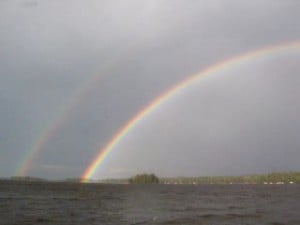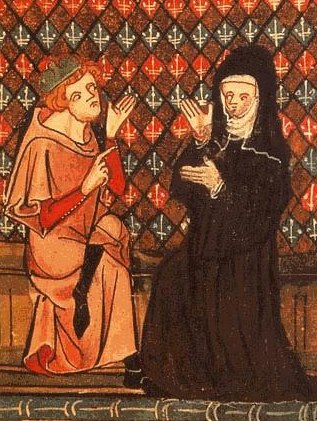In this last post on Karl Giberson’s excellent book Saving Darwin: How to Be a Christian and Believe in Evolution I would like to concentrate on two questions. This is probably one too many, but we will give it a go anyway.
1. What does it mean to worship God as Creator of a world where chance is intrinsic to both the creative process and the world we see?
2. Is there a way out of the culture war in which we are enmeshed – short of the death of science or the abolition of religion?

The universe in which we live is a glorious and marvelous place. The very nature of creation invokes a sense of awe – an awe that only grows as we learn more and more of the details. Giberson is a physicist and begins his journey here:
Natural History is richly layered in surprising ways. At the deepest level of reality the world is so simple it boggles the mind. There are only four kinds of interactions that occur in nature: gravitational, electromagnetic, strong nuclear, and weak nuclear. Every event, from a thought in your head, to the chirp of a bird, to the explosion of a distant star, results from these four interactions.
There are only two kinds of physical objects in the world: quarks and leptons. The familiar protons and neutrons are composed of quarks; the electron is the best known example of a lepton. Every physical object, from a guitar string, to the Mona Lisa, to Pluto (whatever it is these days), is made from quarks and leptons.
All natural phenomena, no matter how rich or mundane, results from two kinds of particles interacting via four kinds of interactions. Who could possibly conceptualize the extraordinary creativity of a world built like this? p. 217
The short history of creation Giberson sketches from this beginning is marvelous indeed. This section of his book is well worth reading.

Unweaving the rainbow – studying nature – need not lead us from wonder or from God. Many other scientist have come to similar conclusions. Several have written books. Stephen M. Barr in his excellent (but highly technical) book Modern Physics and Ancient Faith expounds on the marvelous simplicity and complexity of the nature of the Universe. Francis Collins
marvels at the complexity and beauty of the genetic code – four “letters” A, C, T, G, and only four, encode the information required to assemble a human brain or a sea anemone. The history of our development and connectedness is recorded in our DNA.
John Polkinghorne in Quarks, Chaos & Christianity suggests that the God we worship as creator is neither puppet master nor indifferent spectator.
An evolutionary world is to be understood theologically as a world allowed by the Creator to make itself to large degree. Yet this self-making takes place in a setting of finely tuned potentiality, and I believe that God providentially interacts with its history … In other words, creation is not the starting off of something that is produced ready made; rather it is a continuous process. As I said earlier God is as much the Creator today as God was fourteen billion years ago.
Because continuous creation allows room for creaturely freedom within this process, the consequence will be lots of things that have come about “by chance” in the course of history. I do not believe that it was laid down from the foundation of the world that humankind should have five fingers – it has just worked out that way – but I by no means believe that it is pure accident that beings capable of self-consciousness and of worship have emerged in the course of cosmic history. In other words, there is a general overall purpose being fulfilled in what is going on, but the details of what actually happens are left to the contingencies of history (this happening rather than that). The picture is of a world endowed with fruitfulness, guided by its Creator, but allowed an ability to realize this fruitfulness in its own particular ways. Chance is a sign of freedom, not blind purposelessness. pp. 56-57
Owen Gingerich in God’s Universe reflects in a similar fashion on design and purpose and chance in God’s creation.
But what is the role of randomness and chance in creation? Many Christians struggle with the idea that randomness and chance are important factors in the world we see. On the microscopic atomic and subatomic scale there is no clockwork deterministic mechanism. There are probabilities and possibilities and intrinsic uncertainties. Macroscopic determinism is a consequence of the statistics of large samples. Yet the creative power of our universe lies in the intrinsic uncertainty of individual events. How does this reflect on the nature of God?
As I write this I sit in a room with my son drinking cinnamon spice tea – a habit we both enjoy on cold winter evenings – while working on parallel computers (well I’m writing – he goes more for computer games, Battle for Middle Earth II these days). How much of this was planned by God from the beginning – that I would neglect the kettle and it would spew water in a particular predetermined pattern on the stove? That we would each drink two cups and I would spill a few drops as I poured? Is there room for free-will, forgetfulness, choice, and chance in a world with purpose and design?
Or on another, more fundamental, level – the energy efficient compact fluorescent lights we have installed through most of the house use electricity to excite mercury vapor and the excited atoms fluoresce at 253 nm (primarily). This UV light excites a phosphor that produces the visible white light we want. Each mercury atom, however, emits one photon at one time
dictated by a probabilistic function – a fundamental quantum uncertainty. Each photon is emitted in a purely random manner – there is no way to predict ahead of time exactly when it will appear, or what direction it will travel. Each element of the phosphor absorbs one UV photon and emits one visible photon at a specific time and of a specific color – again the process is inherently random, probabilistic. The result we see (or see by) arises from a collection of intrinsically random probabilistic events. With methods of single molecule spectroscopy using photon counting detectors it is possible today to watch the random statistical processes that lead to the luminescent properties of ordinary macroscopic systems. Did God ordain the time and wavelength for each and every one of these random emission events? Or is there room in nature for chance? And why, you may ask, does it matter?
The world in which we live is awesome – and we stand in awe of the Creator. But our understanding of the world tells us on many levels
and in many ways that randomness and chance and symmetry breaking are
critical elements of the creative power in the world – intrinsic to physics and chemistry and biology. Evolution by random mutation and natural selection is a powerful creative tool – a tool driven by the kind of fundamentally random processes inherent in the emission of a fluorescent light – a tool it appears God used.
What impact does this have on our understanding of God?


